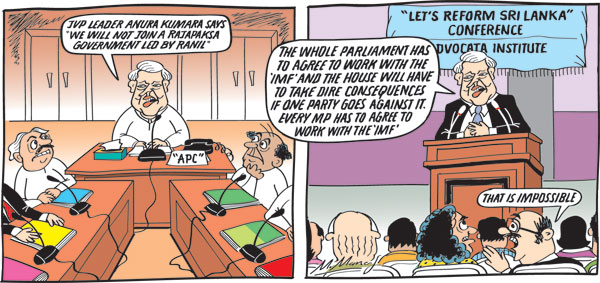Columns
Can we achieve a political consensus on economic policies?
View(s): The prospect of a consensus on economic policies rather than an all-party government is a silver lining amidst the dark economic clouds.
The prospect of a consensus on economic policies rather than an all-party government is a silver lining amidst the dark economic clouds.
There are signs of the main political parties, sans the three-member JVP, coming to a consensus on economic policies rather than the forming of an all-party government.
The Samagi Jana Balawegaya (SJB), the main opposition party in Parliament, is agreeable to arriving at a consensus on economic policies with the Government without joining the Government and taking Cabinet positions.
Other parties such as breakaway groups may take Cabinet and non-Cabinet portfolios, as is the usual practice in Sri Lanka’s coalition politics.This is a significant step in the direction of resolving the severe financial and economic crisis.
Achieving a political consensus on economic policies is of critical significance for the adoption and implementation of pragmatic, realistic and effective economic policies.
President Wickremesinghe nodded his agreement to this proposal and the mechanics of the policy agreement are being worked out.
At last there is some light at the end of the dark tunnel of uncertainty. It also comes at a time people are feeling relief owing to the availability of gas, petrol and diesel.
Imperative policies
Addressing the ‘Lets Reform Sri Lanka’ conference of the Advocata Institute, President Ranil Wickremesinghe reiterated and emphasised there was no way to resolve the economic crisis other than by going for an agreement with the International Monetary Fund (IMF).
Challenge
He challenged anyone to give an alternate solution, if there was one. Furthermore, President Wickremesinghe said the whole Parliament has to agree to work with the IMF and the House will have to take dire actions, if one party or member goes against it.
It appeared highly unlikely an agreement of all parties to go to the IMF could be achieved. Sri Lankan politics is heavily ideological and burdened with moribund ideas and recipes for economic stagnation. Furthermore, it is popular for political parties to oppose the IMF and use the inevitable economic hardships that are conditions to gain political support. Politicians unite to oppose but oppose to unite.
Alternate policies
The President’s challenged anyone to give an alternate solution, if there was one. This was indeed significant as the nation is full of critics of the IMF with no alternate strategies. An often repeated solution to the crisis is that production should be increased and that imports should be banned. The banning of imports to solve the foreign exchange crisis is an impractical policy.
No one is able to suggest an alternative way of repaying the debt and resolving the country’s balance of payments difficulties. It is popular to oppose getting IMF assistance as the conditions of good governance that will be imposed will result in hardships. There is no doubt the IMF would require the Government to bring down the huge fiscal deficit by increasing revenue and curtailing government expenditure.
Another unpopular policy is to reform or privatise loss making enterprises. Many parties, including the Sri Lanka Podujana Peramuna (SLPP) or Pohotuwa that commands a majority in Parliament had insisted it would not sell any state owned enterprise. The JVP and other inconsequential parties too were opposed to privatisation.
Nevertheless there appeared to be an agreement among the main political parties to come to a policy consensus on the main issues. A significant breakthrough was the main opposition parties’ proposal to have an agreement on the main economic policies without joining the Government. The President promptly changed his proposal of an all-party government to a multiparty consensus on policies with most parties participating in the agreement. This was a huge breakthrough that would enable an economic recovery. What is needed is a realistic and pragmatic solution to the current crisis and getting IMF assistance is imperative.
In conclusion
There can be little doubt the immediate economic crisis could be alleviated only by foreign assistance, especially by some bridging finance from the IMF and then a medium and long-term arrangement with the IMF. Several countries including the US, India and China have indicated their support for the IMF to give such assistance.
Ensuring debt sustainability is however a pre-condition of obtaining an Extended Financial Facility (EFF). Furthermore, adopting fiscal and monetary discipline, a series of economic reforms and the elimination of corruption are conditions the EFF would insist on to stabilise the economy.
Final word
Finally, the discussion the President had with political parties on August 5 was indeed constructive. It indicated a coming together of political parties to form a consensus on policies rather than an all-party government. The President was quick to respond, agreeing to a Parliamentary policy consortium. The JVP and some other single member was not party to it. This was predictable as their impractical outlook and undisclosed policies are in stark contrast to much needed pragmatic policies.
Perhaps some other inconsequential parties in Parliament too would be outside this constructive consensual policy consensus. Hopefully this move towards consensual policies will also diminish the prevailing repression of protests and the protestors’ unrest and also reduce strikes in the country for the economy to function.
Buying or selling electronics has never been easier with the help of Hitad.lk! We, at Hitad.lk, hear your needs and endeavour to provide you with the perfect listings of electronics; because we have listings for nearly anything! Search for your favourite electronic items for sale on Hitad.lk today!


Leave a Reply
Post Comment